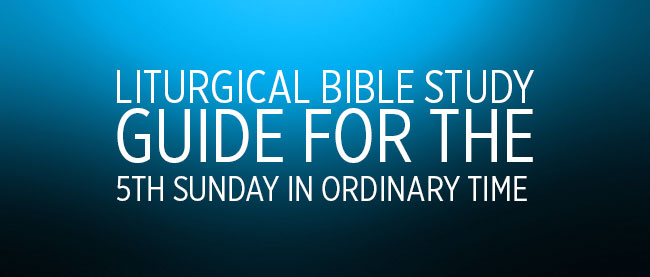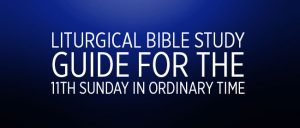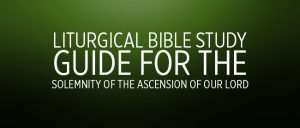1st Reading – Job 7:1-4, 6-7
Job was a foreigner, not descended from Abraham. He was a wise and wealthy man from the Idumean city of Uz (located between Edom and northern Arabia); a region which was famed for its wise men (Jeremiah 49:7). Job believed in the true God, whom he adored and to whom he offered sacrifice; even when he was in the midst of his most severe suffering. Although Job is the subject of the book, he is not the author; the author is unknown although it has been surmised that he was an educated Jew, who probably lived in Palestine but who had visited or lived for a while abroad, primarily in Egypt. The author was well familiar with the prophets and the writings of the wise men of Israel. The book is believed to have been written around the end of the fifth century B.C., later than Jeremiah and Ezekiel, although Job may well have lived more than a thousand years earlier.
The background of the story of Job is this: Job, a pious and blameless man, is perfectly happy and contented. Satan implies to the angels of God’s court that Job’s virtue is not genuine. So, God permits Job to be tested. Blow after blow falls upon Job, depriving him of his possessions and his children. But Job remains faithful, and then is attacked personally; he becomes gravely ill and disfigured. However, he accepts with resignation the physical evil which God sends him, just as he had previously accepted the contentment he enjoyed. Such is Job’s faith that Satan is defeated. But Job’s suffering is so great that he utters a cry of lament (not of despair) when his friends try to console him. Job’s friends consider his suffering to be a punishment for sin, which was the common view at the time, but Job insists that he is blameless. The friends invite him to recognize his fault and beg God’s forgiveness. Although not claiming to be completely free from sin, Job maintains that the suffering is far greater than his faults deserve. Although he knows that God is just, he doesn’t understand why God is sending him all these sufferings. Eventually it is learned that God sends evils and sufferings not only to punish people; their primary purpose is to purify man of his faults and prevent him from committing worse sins.
Our reading for today takes place when Job is having a discussion with his three friends. Here, we hear some of his lament; Job is speaking.
2nd Reading – 1 Corinthians 9:16-19, 22-23
Having addressed the scandals which are evident in the Corinthian church (Cycle A), Saint Paul is now answering the questions which have been asked by this same church. For the last two weeks we have heard him address marriage and virginity. Now, we hear him begin to address their questions about eating meat which has been offered as a sacrifice to idols. This problem is a very practical one. A considerable amount of the meat that was sold in the market came from animals sacrificed to idols. Usually, only certain portions of the sacrificial victims were burned, the remainder becoming the property of the temple priests. Much of this meat was sold to butchers and was available at a lesser cost. Additionally, social life involving friends and family who were still pagans exposed them to common meals at family festivals, including some in the temple of a pagan deity.
The Council of Jerusalem, which took place around A.D. 48-50, had written to the Christians of Antioch, Syria and Cilicia telling them to abstain from food which had been sacrificed to idols (Acts 15:23-29). When Saint Paul was preaching in Corinth two years later, he may not have said anything on the subject, given the very pagan environment of the area – much different from Antioch, Syria and Cilicia. If the faithful at Corinth had to avoid meat of this kind, they would have had to isolate themselves from their fellow citizens.
In replying to this question Saint Paul first explains the general principles that apply: They may eat meat of this type, for idols have no real existence, but sometimes charity requires that they abstain from it; if it was thought that it would lead a new convert back to paganism for example by corrupting the conscience. Paul then illustrates what he
says by telling what he himself does. It is from this illustration that our reading comes.
Gospel – Mark 1:29-39
Jesus is early in His public ministry. He has begun to gather His disciples around him and He has gone to Capernaum and has taught in the synagogue where He astonished all present with His teaching: He teaches like one in authority, not like the scribes (He says “I say to you,” not “the law says”). He speaks of what He knows and testifies to what He has seen (John 3:11). He does, and then preaches, unlike those who teach but do not do (Matthew 23:1-5). While at the synagogue, Jesus also heals a man who is possessed by an evil spirit. In doing this He gives the residents of Capernaum a very clear sign that God’s salvation has come: By overcoming the evil one, Jesus shows that He is the messiah, the savior, one more powerful than demons. Our reading for today immediately follows this event.





